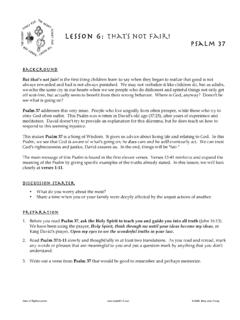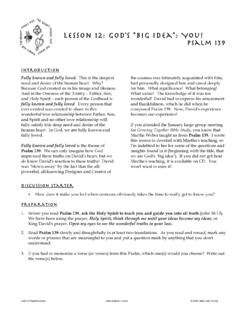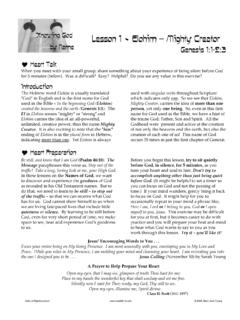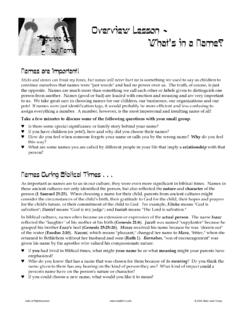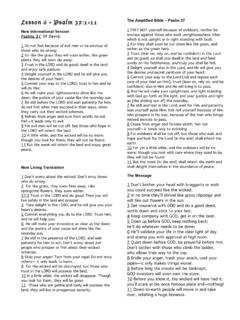Transcription of Lesson 7: Am I Forsaken? Psalm 22 - Online Bible …
1 Oaks of Righteousness 2006, Mary Jean Young Le sso n 7 : Am I For sa k e n? Psa lm 22 Bac k g r o und If you are not familiar with Psalm 22, the first time you read it closely, you'll be thinking, "Hey, wait a minute; this sounds familiar!" Indeed, it is hard to miss the great similarities between this Psalm and the suffering of Christ during his crucifixion as described in the Gospels. Psalm 22 is sometimes called the "fifth Gospel" because it so graphically predicts the suffering, death, and resurrection of Christ. It is also the most frequently quoted Psalm in the Passion stories of the four Gospels. So far in our lessons, we have observed that the Psalms are poetic, praiseful and profitable.
2 Psalm 22 teaches us that the Psalms are also prophetic in that they predict or foreshadow something that will happen in the future. We are reminded as we read Psalm 22, that the Psalms are more than just godly poetry. They are inspired or God-breathed scripture. They are words that come directly from God, through the poet and into our hearts (2 Timothy 3:16-17). Only God could predict with such accuracy the detailed events that would occur and the exact words that would be spoken centuries later. But that is just one side of the story of Psalm 22. As a Song of Lament, this Psalm was written, read and applied centuries before Christ was born. What did this Psalm mean to David who wrote it and his contemporaries who memorized it?
3 How did it comfort and teach generations of the Hebrew people after David? Why did the words of this Psalm come to Jesus' mind when he was suffering? What does Psalm 22 say to us, citizens of the 21st Century? God's Word is multidimensional and multilevel. This Psalm speaks to David's suffering, Christ's suffering and also our suffering! God's Word is living and active (Heb. 4:12)! God's Word is amazing! D i s c uss i o n S tar ter Why does it hurt when a friend rejects you or turns a cold shoulder? Pr epar ati o n 1. Before you read Psalm 22, ask the Holy Spirit to teach you and guide you into all truth (John 16:13). We have been using the prayer, Holy Spirit, think through me until your ideas become my ideas, or King David's prayer, Open my eyes to see the wonderful truths in your law.
4 2. Read Psalm 22 slowly and thoughtfully in at least two translations. As you read and reread, mark any words or phrases that are meaningful to you and put a question mark by anything that you don't understand. 3. Write out some phrases from Psalm 22 that most closely reflect your spiritual or emotional feelings at this time, both positive and negative. 4. There is a definite change of tone from despair to praise in the middle of this Psalm . Between which two verses does this change seem to occur? Ques ti o ns 5. Put David's questions and complaint from 22:1-2 into your own words. How would you express these thoughts in more contemporary language? Why have you forsaken me?
5 Forsake is much more than someone ignoring you and not caring about your suffering. Forsake means to withdraw protection and support that was once given. It means to abandon, desert, withdraw and disown. Forsake means that there once was a supportive, loving relationship, but now, when you need it most, that support has been intentionally cut off and you are left to fend for yourself. Considering the meaning of forsake, why are the questions in 22:1 particularly painful? How would the meaning of 22:1 be changed if it read, "Oh God, oh God .." instead of My God, my God ..?" 6. Besides feeling forsaken , what two specific complaints does the sufferer have about what he perceives to be God's behavior in 22:1-2?
6 Even though the Psalmist feels forsaken by God, what does he continue to do in 22:2? What should we do when God seems silent or distant? Is this easy or hard for you to do? 7. Despite feeling forsaken , what is the sufferer's response to God? 22:3 What does this response reveal about the act of worship? The NIV margin note tells us that 22:3 can be translated, Yet you are holy, enthroned on the praises of Israel. What promise does this hold for us when we choose to praise God despite how we are feeling or what we are experiencing? 8. Why is the sufferer confident that God will eventually rescue and deliver him? 22:4-5 What are some specific things God has done for you in the past that you can use to "remind" God of his faithfulness as well as boost your own faith when you are in a hard place?
7 What can you can do to help yourself remember what God has done for you? 9. Besides feeling forsaken by God, what else is the sufferer experiencing? 22:6-8? People mocking the sufferer because he trusts in God is particularly painful. The mockers are insinuating that either the sufferer really isn't trusting God even though he says he is or, that God doesn't really love the sufferer or care about his suffering. When you see someone suffering, what would be a compassionate response? Which is worse to feel that God has abandoned you by being distant and silent or to feel less than human because you are mocked and ridiculed by those around you? Why? Have you ever had people ridicule you for trusting God, especially when God didn't seem to be helping much?
8 Did this tend to strengthen or weaken your faith in God? 10. Even though people around him have turned against him, in what does the sufferer take comfort? 22:9-10 In the Psalms, we have been given images or word pictures of God as a Rock, a King, a Shepherd and a Host, to name a few. Some would suggest that Psalm 22:9-10 presents the image of God as a Midwife. Look closely at these verses and consider how God is like a midwife. Take some time to think about the role, relationship and responsibility of the midwife to the baby before and after birth. In your small group, discuss and develop this interesting image of God. Consider Psalm 27:10 in your discussion.
9 11. In 22:12-18, the sufferer describes his external and internal condition. According to 22:12-13 and 16-18, what types of things are happening around him that add to his suffering? In the Psalms, enemies are likened to a host of dangerous animals. In Psalm 22, David uses the metaphor of bulls or wild oxen, lions and dogs. When have you known people to be like the animals described in 22:12-13, 16? When have you felt like David did? What is a modern day equivalent of 22:18? (Hint: When someone is close to death, but not yet dead, what do inconsiderate family members sometimes do?) How does this make the sufferer feel? 12. How does the sufferer describe what he is physically feeling because of his enemies in 22:14-15, 17?
10 Have you ever been so emotionally upset that it made you feel like what is described in 22:14-5, 17? What are some actual physical conditions that might have the symptoms described in these verses? 13. Why does David go into such detail as to what he is feeling and experiencing? What is the point? How can we benefit from this description? 14. What does the sufferer see as the solution to his problems and what specifically does he ask for? 22:11,19-21. 15. Notice the mood shift in this Psalm between verses 1-21 and 22-31. According to 22:4, what changed the sufferer's attitude? 16. In gratitude for God's rescue and deliverance, David wants to host a world -wide feast to honor God.
